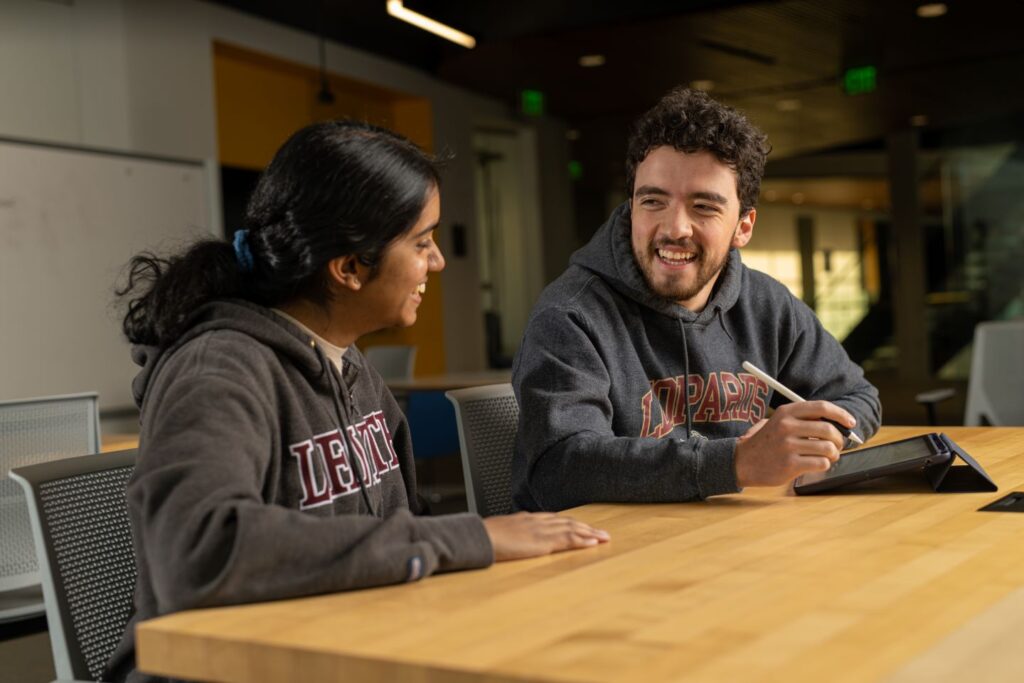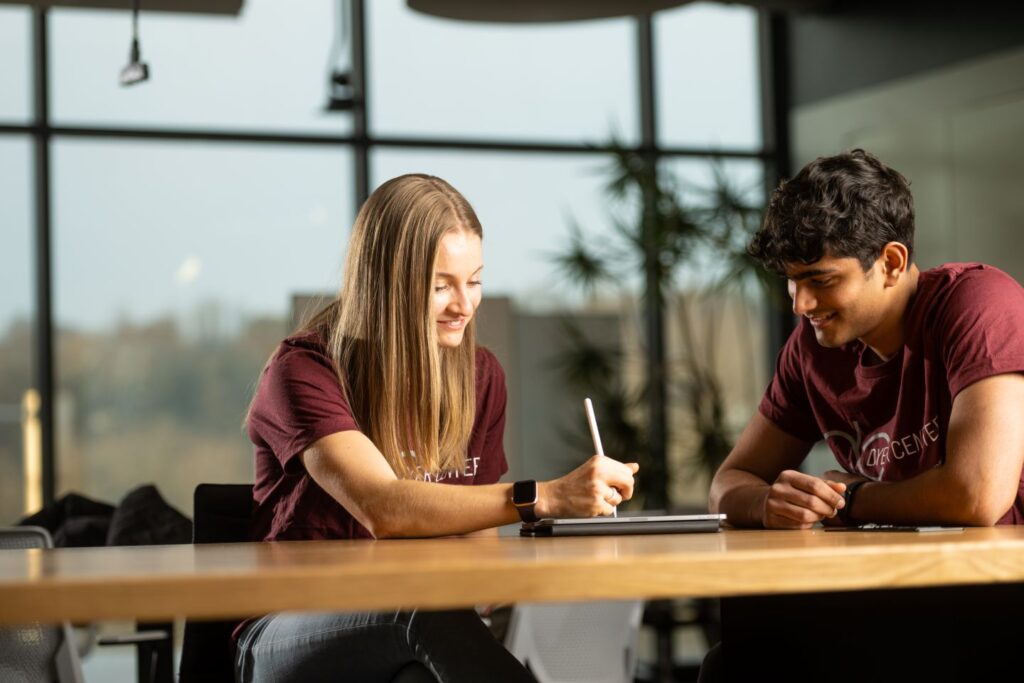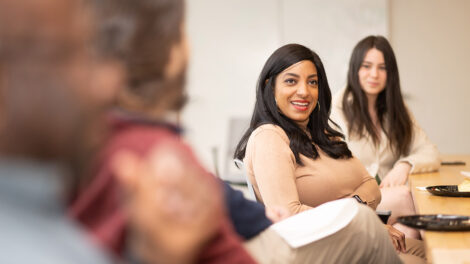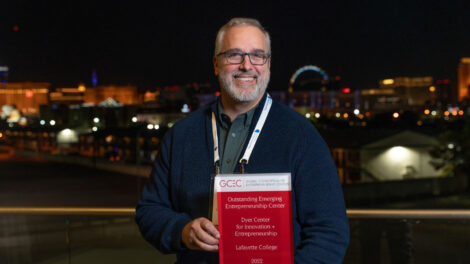Dyer Center fellows advance ideas, dreams
By Bryan Hay
It’s been a journey of discovery and growth for Dyer Center fellows as they fine-tune their innovative ideas and develop a spirit of entrepreneurship.
With two years into their work, Swetha Reddy Tadisina ’25 and Daniel Andrade ’25 have established meaningful relationships in the Easton community to advance their innovative ideas and make a difference on campus and in the city.
First-year fellows Sarah Pezzino ’26 and Kashif Chopra ’26 are also well on their way, strengthening their entrepreneurial skill sets to help fulfill their dreams and ambitions.
“The experiences of the Dyer fellows illustrate the kind of entrepreneurially minded students that Lafayette attracts. They demonstrate how the Dyer Center provides opportunities for students to create innovative ventures, align their interests with their academic pursuits, and gain valuable skills beyond the classroom,” says Tobias Rossmann, associate professor of mechanical engineering and Dyer Center interim director.
“By leveraging the resources and guidance offered by the Dyer Center, these students are maximizing their college experience and setting themselves up for success,” he says.
During a recent gathering at Dyer, the fellows provided updates about their projects.

Swetha Reddy Tadisina ’25 and Daniel Andrade ’25
Daniel Andrade ’25
Hometown: Quito, Ecuador
Despite being minutes away, the distance between Easton and Lafayette can be felt throughout the community; that’s why my team has been working on a venture centered around connecting both entities. Our main goal is to tear down the mindset that Lafayette is distant and separated from the city of Easton, so we can feel that we belong to a true college town.
We realized that many students may not see the appeal of going downtown as the walk uphill makes it seem inaccessible, and there is a lack of activities that would encourage them to engage more with the community. To achieve our goal, we are working on events that would feature Lafayette talent downtown, such as a musical festival for student artists and bands to perform for the residents of Easton and their fellow classmates. We are also in talks with the Meyner Center and business owners in Easton to organize a film festival, where Lafayette students could get the opportunity to showcase their work, while all attendees enjoy the dining options available around town.
On top of that we’ve been considering long-term plans to bridge the gap between Lafayette and Easton through transportation, professional development, and new initiatives that incentivize students to explore what the city has to offer. Among these initiatives, we’re considering an app that would allow students, faculty, staff, and even campus visitors to see what stores, restaurants, and activities they can enjoy in Easton. This would make visiting downtown a friendlier experience, and for it to be much more appealing for everyone who wants to engage with the city.
Another idea we’ve been brainstorming is getting the LCAT system to become electric. This, in particular, is special to me as my personal passion is renewable energy. I want to work on energy systems once I graduate and learn how we can utilize them to improve the world. My hopes are that someday I’ll be able to help my home country, by using everything that I’m learning here as a Dyer fellow and as a student at Lafayette College.
Swetha Tadisina ’25
Hometown: Hyderabad, India
Last year, I was paired with ProJeCt of Easton. I volunteered at its Literacy Center and food pantry at first, and worked with the computer science department to manage and build a functional and intelligent database management system for them to help the organization manage its operations.
This year, I’m working with Daniel Andrade, another Dyer fellow, on a project to increase mobility of people between Lafayette and Easton.
One reason that I came to Lafayette was because I wanted more than just academics in the curriculum. I wanted a way to apply knowledge in useful ways. The Dyer fellowship gives you room to think about how you can do that for the rest of your life through entrepreneurship.
One of the first points of contact for me at Lafayette was the Dyer Center. Right after I got selected to be part of the 2025 cohort of Lafayette students, I applied for the fellowship. It just gives you confidence to go above and beyond, and take ownership of your education. The Dyer experience helps support my end goal, which is to go back to India and participate and lead the nation-building process.

Sarah Pezzino ’26 and Kashif Chopra ’26
Sarah Pezzino ’26
Hometown: Nazareth, Pa.
My mom worked at Lafayette for over 14 years, so I grew up on the Lafayette campus. I watched the construction of Rockwell Integrated Sciences Center. When I first walked in, I saw the Dyer Center. What is this? I needed to learn more about it. So, I did a Google search. I looked it up and read what it was about. I found the fellowship. And right after reading the words ‘designing your entrepreneur road map,’ I just knew it was for me.
As of now, this is my first year of the fellowship. I am working on completing my Google certificate in UX design, and that’s bringing me some great insights on how to build my entrepreneurial profile as well as understand my customer in the future. And I’m also working with Century Promise, a nonprofit in Allentown. I’m helping them launch their pilot program and helping their youth workforce development program.
I’m driven by passion. I absolutely love to just dive right into everything I’m doing. And I really think the Dyer fellowship is making my college experience that much better, because it’s allowing me to follow my passion with my education. It has not only helped me grow as a student but to grow as a person, helping my future self become the best entrepreneur I can be.
My goal after Lafayette is to establish a nonprofit in honor of my mom, who lost her battle to cancer in November 2022, and have my own business in nutrition and fitness coaching to help people become the best version of themselves.
Kashif Chopra ’26
Hometown: Gurgaon, India
While I was researching about the College, I read about the Dyer Center and found out about this fellowship program. It instantly stood out to me because I was quite into innovation and entrepreneurship from before. In high school, I’d done different kinds of entrepreneurship competitions. I was getting into these with the aim of learning about how to start a company from end to end. So, when I read about the Dyer fellowship, it really excited me, and I saw the four-year plan. It has worked out perfectly.
Right now, we’re trying to understand where our passions lie. I’m volunteering with a community-based organization called Community Bike Works in Easton that serves students in the West Ward, historically an underprivileged area of the city. Children whose parents work most of the day and can’t be home to take care of their kids, come there after school hours and learn how to fix bikes. On completing the program, they ‘earn’ the bike they fixed and can take it home. As a volunteer, I help out with the operations and see how we can scale up their project.
I like the process of designing and engineering a lot. I want to go ahead in this field and see where that takes me. Maybe I’ll be working as a product designer, making products better for people. I may want to start a company of my own. I come from India, so I want to do something that works in benefiting people from underprivileged communities.
The Dyer Center fellowship is one of the best programs on campus. Recently I was speaking to the incoming students who are applying for the 2027 cohort at Dyer. I told them that this is one of my favorite things to do here, because it’s directly related to what I want to pursue.
All of the activities at Dyer tie in with other activities I’m doing on campus as well. I’m in the motorsports club, and Dyer skills apply there. They teach you how to think and design, and that goes hand in hand with my engineering classes. We had one activity over here where Prof. Tobias Rossmann (associate professor of mechanical engineering and Dyer Center interim director) gave us basic resources like pipe cleaners, Play-Doh, duct tape, and ice cream sticks to create a product and learn the basic design process methodology. These are skills that you can utilize in other classes as well. It all goes hand in hand.

